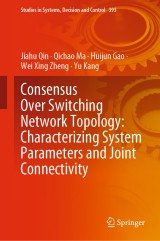Details

Consensus Over Switching Network Topology: Characterizing System Parameters and Joint Connectivity
Studies in Systems, Decision and Control, Band 393
|
128,39 € |
|
| Verlag: | Springer |
| Format: | |
| Veröffentl.: | 27.10.2021 |
| ISBN/EAN: | 9783030856571 |
| Sprache: | englisch |
| Anzahl Seiten: | 246 |
Dieses eBook enthält ein Wasserzeichen.
Beschreibungen
<p>This book aims to extend existing works on consensus of multi-agent systems systematically. The agents to be considered range from double integrators to generic linear systems. The primary goal is to explicitly characterize how agent parameters, which reflect both self-dynamics and inner coupling of each agent, and switching network topologies jointly influence the collective behaviors. A series of necessary and/or sufficient conditions for exponential consensus are derived. </p>
The contents of this book are as follows. Chapter 1 provides the background and briefly reviews the advances of consensus of multi-agent systems. Chapter 2 addresses the consensus problem of double integrators over directed switching network topologies. It is proven that exponential consensus can be secured under very mild conditions incorporating the damping gain and network topology. Chapter 3 considers generic linear systems with undirected switching network topologies. Necessary and sufficient conditions on agent parameters and connectivity of the communication graph for exponential consensus are provided. Chapter 4 furthers the study of consensus for multiple generic linear systems by considering directed switching network topologies. How agent parameters and joint connectivity work together for reaching consensus is characterized from an algebraic and geometric view. Chapter 5 extends the design and analysis methodology to containment control problem, where there exist multiple leaders. A novel analysis framework from the perspective of state transition matrix is developed. This framework relates containment to consensus and overcomes the difficulty of construction of a containment error.<div><br></div><div>This book serves as a reference to the main research issues and results on consensus of multi-agent systems. Some prerequisites for reading this book include linear system theory, matrix theory, mathematics, and so on.</div>
The contents of this book are as follows. Chapter 1 provides the background and briefly reviews the advances of consensus of multi-agent systems. Chapter 2 addresses the consensus problem of double integrators over directed switching network topologies. It is proven that exponential consensus can be secured under very mild conditions incorporating the damping gain and network topology. Chapter 3 considers generic linear systems with undirected switching network topologies. Necessary and sufficient conditions on agent parameters and connectivity of the communication graph for exponential consensus are provided. Chapter 4 furthers the study of consensus for multiple generic linear systems by considering directed switching network topologies. How agent parameters and joint connectivity work together for reaching consensus is characterized from an algebraic and geometric view. Chapter 5 extends the design and analysis methodology to containment control problem, where there exist multiple leaders. A novel analysis framework from the perspective of state transition matrix is developed. This framework relates containment to consensus and overcomes the difficulty of construction of a containment error.<div><br></div><div>This book serves as a reference to the main research issues and results on consensus of multi-agent systems. Some prerequisites for reading this book include linear system theory, matrix theory, mathematics, and so on.</div>
Introduction.- Consensus of Double-integrators over Switching Network Topology.- Generic Linear Systems over Undirected Network: Controllability and Connectivity.- Generic Linear Systems over Directed Switching Network Topology.- Extensions to Containment Control.<p></p>
<p>This book aims to extend existing works on consensus of multi-agent systems systematically. The agents to be considered range from double integrators to generic linear systems. The primary goal is to explicitly characterize how agent parameters, which reflect both self-dynamics and inner coupling of each agent, and switching network topologies jointly influence the collective behaviors. A series of necessary and/or sufficient conditions for exponential consensus are derived. </p>The contents of this book are as follows. Chapter 1 provides the background and briefly reviews the advances of consensus of multi-agent systems. Chapter 2 addresses the consensus problem of double integrators over directed switching network topologies. It is proven that exponential consensus can be secured under very mild conditions incorporating the damping gain and network topology. Chapter 3 considers generic linear systems with undirected switching network topologies. Necessary and sufficient conditions on agent parameters and connectivity of the communication graph for exponential consensus are provided. Chapter 4 furthers the study of consensus for multiple generic linear systems by considering directed switching network topologies. How agent parameters and joint connectivity work together for reaching consensus is characterized from an algebraic and geometric view. Chapter 5 extends the design and analysis methodology to containment control problem, where there exist multiple leaders. A novel analysis framework from the perspective of state transition matrix is developed. This framework relates containment to consensus and overcomes the difficulty of construction of a containment error.<div><br></div><div>This book serves as a reference to the main research issues and results on consensus of multi-agent systems. Some prerequisites for reading this book include linear system theory, matrix theory, mathematics, and so on.</div>
Deals with the consensus for networked agents ranging from double integrators to generic linear systems Characterizes how agent parameters and switching network topology jointly influence the collective behavior Presents a series of necessary and sufficient conditions for exponential consensus of linear agents


















